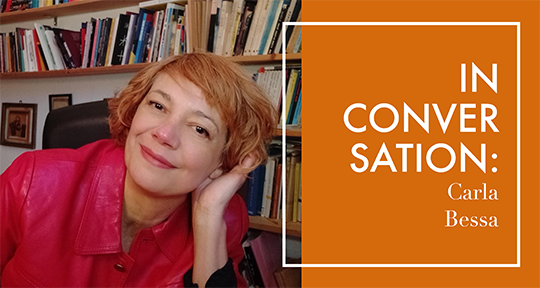Carla Bessa wears many hats: theater actress, director, poet, short story writer, novelist, and translator. Born in Rio de Janeiro and now based in Berlin, she has translated Germanophone writers—Max Frisch (Switzerland), Ingeborg Bachmann (Austria), Thomas Macho (Austria), Christa Wolf (Germany), and more—into Brazilian Portuguese for São Paulo-based publishers WMF Martins Fontes and Editora Estação Liberdade, as well as Editora Trinta Zero Nove in Mozambique. As a translator, she works on fiction and nonfiction as well as young adult and children’s literature. As a writer, she writes what may be termed as “cross-genre” or “hybrid works,” questioning the boundaries demarcating limitless possibilities; this would eventually earn her Brazil’s most important literary award, the Prêmio Jabuti, given to her short story collection Urubus (The Vultures, Confraria do vento, 2019).
In this interview, I spoke with Carla on her award-winning works that cross the conventional genres of poetry, play, and prose; linguistic politics in the Lusophone world; and the intricacies of translating German-language writers into the Brazilian Portuguese.
Author photo by Hubert Börsig.
Alton Melvar M Dapanas (AMMD): Urubus and Todas uma, two of your short story collections, were translated by Lea Hübner into the German for Transit Verlag. Your 2017 book, Aí eu fiquei sem esse filho, on other hand, was rendered into the Greek by Nikos Pratsinis for Skarifima Editions. In the Anglosphere, you have been translated by Fábio Mariano and Elton Uliana. To anyone working on your works from their Brazilian Portuguese originals, what demands do you think these translators would face—in particular those translating you into German and English?
Carla Bessa (CB): The other day, I read an interview with my colleague Hinrich Schmidt-Henkel—the German translator of Nobel laureate Jon Fosse—in which he said: “Every literary text is an aesthetic project in its own terms. The translation is good if it realizes this aesthetic project in a style that is appropriate and consistent without breaks.”
I agree with that, despite the particularities of syntactic and verbal structures between Brazilian Portuguese and German. (As for English: I haven’t mastered this language in depth, but I dare say that the differences are minor.) I believe that the greatest difficulty in translating my texts is not of a textual or grammatical nature, but a cultural one. In my writing, I work very closely with spoken language, sometimes even using a kind of verbatim technique. So the translator of my work needs to have an in-depth knowledge not only of the environment where the stories take place—specifically the suburbs of Rio de Janeiro—but also, and above all, of the musicality of the Brazilian Portuguese spoken in these layers of society that I portray. I was very pleased that the translators who have translated me into English so far—Elton Uliana and Fabio Mariano—are Brazilian. Normally, we tend to think that a literary translator should have the target language as their mother tongue, but I don’t think that applies to all types of texts. In my case, the main challenge lies precisely in transferring this specific social environment with its many overlapping layers of cultural influences into the language and reality of German- and English-speaking countries, because this environment and its characters are the basis of my aesthetic project: to return here to the idea presented by Schmidt-Henkel.




